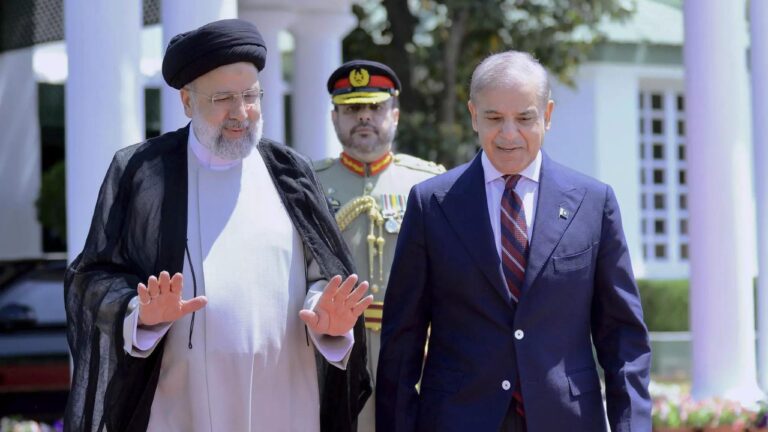ISLAMABAD: Islamabad and Tehran on Wednesday “rapidly concluded” a free trade agreement (FTA) and postponed the next business and trade body meeting, shortly after the US warned Pakistan of the risk of sanctions for doing business with Iran. It was agreed that the event would be held.
Following Iranian President Ebrahim Raisi’s three-day visit to Pakistan, both countries issued a joint statement saying they had reviewed the full scope of bilateral relations.
Raisi’s visit comes as tensions escalated earlier this year after Iran launched attacks on Pakistani territory in the restive Baluchistan province in southwest Pakistan, which is believed to be a stronghold of the militant group Jaish al-Adl. The move comes as both countries try to repair strained relations. Within 48 hours, Pakistan’s military carried out retaliatory strikes inside Iran, which it described as a “hideout used by terrorist organizations.”
Raisi, the first Iranian president to visit Pakistan in eight years, met with the country’s top leadership, including Prime Minister Shehbaz Sharif, President Asif Zardari, and Army Chief of Staff Asim Munir during his visit. He also invited President Zardari and Prime Minister Sharif to make an official visit to Iran.
A joint statement between Iran and Pakistan said, “They (Pakistan and Iran) reiterated the importance of cooperation in the energy sector, including power trade, transmission lines, and the Iran-Pakistan gas pipeline project,” and said, It reminded me of the goal of both countries to increase the number of people. Bilateral trade will expand from the current $2 billion to $10 billion over the next five years.
“In order to promote economic and commercial activities, an agreement was reached to fully operate the barter mechanism between the two countries,” the handout said.
The gas pipeline project has been stalled for more than a decade due to political turmoil and international sanctions.
The US State Department on Tuesday warned Islamabad of the risk of sanctions for pledging to strengthen security and economic cooperation with Iran during Raisi’s visit.
“I would advise anyone considering doing business with Iran to be aware of the potential risk of sanctions. But ultimately, the Pakistani government can speak out about its own foreign policy pursuits.” said US State Department spokesperson Vedant Patel at a press conference.
Observers said the threat of implicit sanctions comes at a difficult time for Pakistan, which is struggling economically and is under pressure from its allies, especially key allies such as the United States, Saudi Arabia and the United Arab Emirates. Seeking financial support. It is considered an enemy of Iran.
Following Iranian President Ebrahim Raisi’s three-day visit to Pakistan, both countries issued a joint statement saying they had reviewed the full scope of bilateral relations.
Raisi’s visit comes as tensions escalated earlier this year after Iran launched attacks on Pakistani territory in the restive Baluchistan province in southwest Pakistan, which is believed to be a stronghold of the militant group Jaish al-Adl. The move comes as both countries try to repair strained relations. Within 48 hours, Pakistan’s military carried out retaliatory strikes inside Iran, which it described as a “hideout used by terrorist organizations.”
Raisi, the first Iranian president to visit Pakistan in eight years, met with the country’s top leadership, including Prime Minister Shehbaz Sharif, President Asif Zardari, and Army Chief of Staff Asim Munir during his visit. He also invited President Zardari and Prime Minister Sharif to make an official visit to Iran.
A joint statement between Iran and Pakistan said, “They (Pakistan and Iran) reiterated the importance of cooperation in the energy sector, including power trade, transmission lines, and the Iran-Pakistan gas pipeline project,” and said, It reminded me of the goal of both countries to increase the number of people. Bilateral trade will expand from the current $2 billion to $10 billion over the next five years.
“In order to promote economic and commercial activities, an agreement was reached to fully operate the barter mechanism between the two countries,” the handout said.
The gas pipeline project has been stalled for more than a decade due to political turmoil and international sanctions.
Expanding
“I would advise anyone considering doing business with Iran to be aware of the potential risk of sanctions. But ultimately, the Pakistani government can speak out about its own foreign policy pursuits.” said US State Department spokesperson Vedant Patel at a press conference.
Observers said the threat of implicit sanctions comes at a difficult time for Pakistan, which is struggling economically and is under pressure from its allies, especially key allies such as the United States, Saudi Arabia and the United Arab Emirates. Seeking financial support. It is considered an enemy of Iran.

